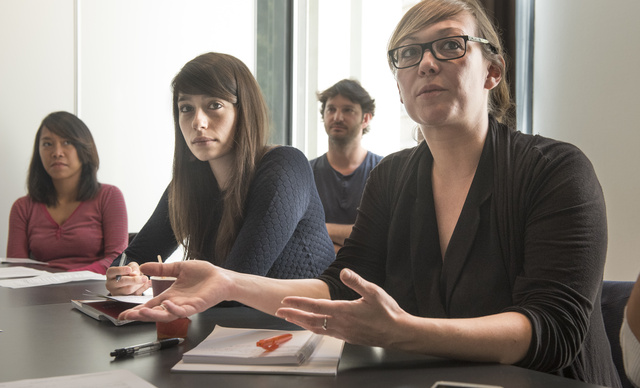Teaching: paving the way for tomorrow’s research and medicine
Just like treatment and research, training and education are an integral part of Institut Curie’s founding social missions. Our aim is to prepare future leaders. This is essential if we are to contribute to the evolution of research and medicine and maintain our level of excellence.erche et de la médecine et maintenir un niveau d’excellence.

Institut Curie has a dedicated budget for advanced training, providing for education at all levels. Tutoring programs provide a personalized approach for each student and encourage interaction between experienced professionals and the next generation.
Courses are taught at Institut Curie, but many researchers and caregivers also teach in partner universities and educational institutions, as well as abroad.
Internationally renowned courses
The Training unit has been developing international courses for more than 10 years. Offering a combination of lectures, workshops, and discussions and featuring prestigious experts, they promote cutting-edge learning in a multicultural, interdisciplinary context.
They are open to master’s, doctoral and post-doctoral students. Courses cover the main categories of Institut Curie research:
- Developmental and cellular biology.
- Immunology.
- Human genetics and carcinogenesis.
- Epigenetics and genotoxicology.
- Pharmaceutical chemistry.
- Physical chemistry of biological systems.
- Molecular mechanisms and carcinogenesis.
- Cellular and molecular imaging.
- Bioinformatics
- Systems biology
General courses
General courses are devoted to cross-disciplinary learning. They help both working professionals and students to keep their knowledge up-to-date.
Technical courses: these courses train students in the latest technologies and techniques available at Institut Curie, such as imaging, high-throughput sequencing, and so on.
General courses: from studying French as a foreign language, writing scientific articles, understanding intellectual property, and transfer technologies, to scientific communication and more, Institut Curie offers a range of training to help researchers and physicians develop these important skills.
University diplomas and inter-university diplomas
A number of university diplomas (DU) and inter-university diplomas (DIU) are available to physicians, pharmacists, and researchers looking to expand their knowledge and expertise in:
- Oncogenetics.
- Oncopharmacology.
- Gastrointestinal oncology.
- Breast disease.
- Radiobiology, radioprotection in radiotherapy.
- Molecular medicine in oncology.
- Ocular oncology.
- Sarcomas.
They are run by Institut Curie physicians and offered in collaboration with partner universities (Paris-Descartes, Versailles-Saint Quentin).
Promoting the emergence of a medical-science culture
Another emphasis of the Teaching unit involves bringing together research and treatment by offering training programs that meet the specific needs and dynamics of the Research Center and Hospital Group.
Along with ENS, Institut Pasteur, ESPCI, Collège de France, and PSL, Institut Curie is an active participant in the Medical Sciences program, which offers scientific training to students in medicine and pharmacy.
To promote the emergence of a common culture, three scholarships are available to physicians or pharmacists who write a scientific thesis alongside their thesis in medicine or pharmacy. Scholarships are also available to fund Master 2 courses that teach research.
Preparing tomorrow’s talents
The Institut also emphasizes training for its undergraduate and doctoral students, post-docs, interns, nurses, and caregivers, who play a major role in running laboratories and providing care.
The Institut supports their choices and career path through the Advanced Training program. Since 2016, it has been hosting additional foreign doctoral students in research laboratories thanks to joint funding from the European Commission as part of the Marie Sklodowska-Curie Horizon 2020 activities. This European Union program strives to promote international, interdisciplinary, and intersector (3i) connections for new generations of researchers. These 12 young talents were selected from a pool of 326 candidates and will be supported throughout their thesis to begin their research career under the best possible conditions. The five-year program will ultimately benefit 35 students.
Institut Curie also plans to create a French-Chinese School of Oncology. As of September 2017, Institut Curie will be hosting some 50 future Chinese physicians for 18 to 24 months to help them achieve European standards of care.
Teaching and research are closely intertwined throughout the career of both scientists and caregivers. The quality of its teaching is also a reflection of and testimonial to the Institut’s expertise and its commitment to bringing out tomorrow’s leaders.
